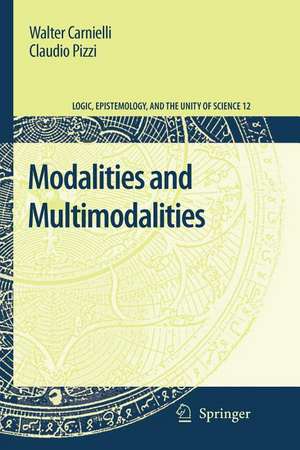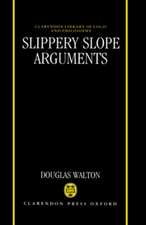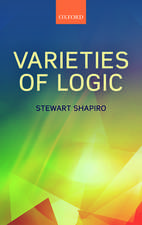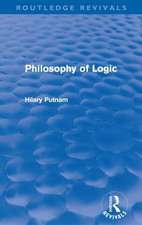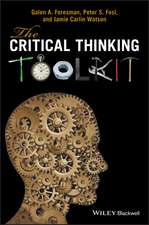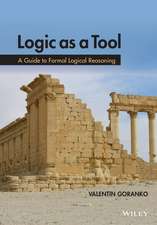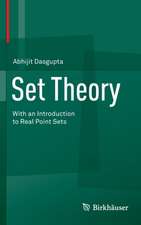Modalities and Multimodalities: Logic, Epistemology, and the Unity of Science, cartea 12
Juliana Bueno-Soler Autor Walter Carnielli, Claudio Pizzien Limba Engleză Paperback – 30 noi 2010
| Toate formatele și edițiile | Preț | Express |
|---|---|---|
| Paperback (2) | 926.46 lei 6-8 săpt. | |
| SPRINGER NETHERLANDS – 30 noi 2010 | 926.46 lei 6-8 săpt. | |
| SPRINGER NETHERLANDS – 5 noi 2009 | 926.46 lei 6-8 săpt. | |
| Hardback (1) | 932.48 lei 6-8 săpt. | |
| SPRINGER NETHERLANDS – 14 oct 2008 | 932.48 lei 6-8 săpt. |
Din seria Logic, Epistemology, and the Unity of Science
-
 Preț: 1225.30 lei
Preț: 1225.30 lei - 18%
 Preț: 1208.05 lei
Preț: 1208.05 lei - 18%
 Preț: 981.04 lei
Preț: 981.04 lei - 18%
 Preț: 926.46 lei
Preț: 926.46 lei - 18%
 Preț: 1210.19 lei
Preț: 1210.19 lei - 18%
 Preț: 1199.22 lei
Preț: 1199.22 lei - 18%
 Preț: 936.35 lei
Preț: 936.35 lei - 15%
 Preț: 631.92 lei
Preț: 631.92 lei - 24%
 Preț: 1058.18 lei
Preț: 1058.18 lei - 20%
 Preț: 558.61 lei
Preț: 558.61 lei - 24%
 Preț: 878.88 lei
Preț: 878.88 lei - 18%
 Preț: 1211.90 lei
Preț: 1211.90 lei - 24%
 Preț: 896.26 lei
Preț: 896.26 lei - 24%
 Preț: 791.22 lei
Preț: 791.22 lei - 24%
 Preț: 727.45 lei
Preț: 727.45 lei - 24%
 Preț: 789.86 lei
Preț: 789.86 lei - 20%
 Preț: 561.65 lei
Preț: 561.65 lei - 20%
 Preț: 560.27 lei
Preț: 560.27 lei - 20%
 Preț: 568.71 lei
Preț: 568.71 lei - 24%
 Preț: 1046.16 lei
Preț: 1046.16 lei - 24%
 Preț: 698.12 lei
Preț: 698.12 lei - 20%
 Preț: 549.85 lei
Preț: 549.85 lei - 18%
 Preț: 939.31 lei
Preț: 939.31 lei - 20%
 Preț: 580.50 lei
Preț: 580.50 lei - 20%
 Preț: 550.73 lei
Preț: 550.73 lei
Preț: 926.46 lei
Preț vechi: 1129.83 lei
-18% Nou
Puncte Express: 1390
Preț estimativ în valută:
177.29€ • 186.94$ • 147.59£
177.29€ • 186.94$ • 147.59£
Carte tipărită la comandă
Livrare economică 10-24 ianuarie 25
Preluare comenzi: 021 569.72.76
Specificații
ISBN-13: 9789048179244
ISBN-10: 9048179246
Pagini: 320
Ilustrații: XIV, 304 p.
Dimensiuni: 155 x 235 x 17 mm
Greutate: 0.45 kg
Ediția:Softcover reprint of hardcover 1st ed. 2008
Editura: SPRINGER NETHERLANDS
Colecția Springer
Seria Logic, Epistemology, and the Unity of Science
Locul publicării:Dordrecht, Netherlands
ISBN-10: 9048179246
Pagini: 320
Ilustrații: XIV, 304 p.
Dimensiuni: 155 x 235 x 17 mm
Greutate: 0.45 kg
Ediția:Softcover reprint of hardcover 1st ed. 2008
Editura: SPRINGER NETHERLANDS
Colecția Springer
Seria Logic, Epistemology, and the Unity of Science
Locul publicării:Dordrecht, Netherlands
Public țintă
ResearchCuprins
Modal logic and standard logic.- The syntax of normal modal systems.- The semantics of normal modal systems.- Completeness and canonicity.- Incompleteness and finite models.- Temporal logics.- Epistemic logic: knowledge and belief.- Multimodal logics.- Towards quantified modal logic.
Recenzii
From the reviews:
"This is mainly an introductory textbook on modal logic containing, apart from standard topics, some very important recent material which is not regularly included in other textbooks. [...] It is important to note that several of the different topics dealt with in the book are accompanied by philosophical remarks." Max A. Freund (San José), taken from his review of the Italian version Modalità e Multimodalità
“This revised work constitutes an introduction to standard topics in modal logic. There are other sections presenting valuable material not generally included in elementary textbooks on modal logic … . The book is written in a clear and agreeable style and useful exercises and references for further reading are given at the end of each chapter. … Due to all these features, the book is well suited for an introductory course in modal logic or as supplementary reading in an intermediate logic course.” (Max A. Freund, Zentralblatt MATH, Vol. 1210, 2011)
"This is mainly an introductory textbook on modal logic containing, apart from standard topics, some very important recent material which is not regularly included in other textbooks. [...] It is important to note that several of the different topics dealt with in the book are accompanied by philosophical remarks." Max A. Freund (San José), taken from his review of the Italian version Modalità e Multimodalità
“This revised work constitutes an introduction to standard topics in modal logic. There are other sections presenting valuable material not generally included in elementary textbooks on modal logic … . The book is written in a clear and agreeable style and useful exercises and references for further reading are given at the end of each chapter. … Due to all these features, the book is well suited for an introductory course in modal logic or as supplementary reading in an intermediate logic course.” (Max A. Freund, Zentralblatt MATH, Vol. 1210, 2011)
Notă biografică
Walter Carnielli is Full Professor of Logic, Department of Philosophy, State University of Campinas, Brazil. Ex-Director of the Centre for Logic, Epistemology and the History of Science (1998-2004) and full member of the Security and Quantum Information Group-- Institute of Telecommunications, Lisbon, Portugal. Grantee of the Alexander von Humboldt Foundation, Germany, held temporary positions and research appointments in the USA (University of California, Berkeley), as well as in several institutions in Chile, Colombia, Venezuela, Italy, Germany (Münster and Bonn), France, Spain, Portugal and Luxembourg. Carnielli is known for his contribution to the proof theory and semantics for contemporary heterodox (non-classical) logics. Of special significance are his contributions to many-valued logics, paraconsistent logics and combinations of logics. With his students and collaborators Carnielli introduced the possible-translations semantics, which led to a revival in the semantic interpretation of paraconsistent logics, and the concept of logics of formal inconsistency which systematize a great number of extant paraconsistent logics, opening the way to applications of paraconsistency to computer science and to philosophical investigations around the topic. Carnielli has also worked on finite and infinite combinatorics, and shaped, with collaborators, the modulated logics, a wide class of logics dedicated to formalize quantified uncertain reasoning. He is the author or co-author of more than academic 70 publications (papers, books and monographs).
Claudio Pizzi is Full Professor of Philosophy of Science at the Faculty of Letters of the University of Siena (Italy) and contract professor at the University of Milano Bicocca. His main interests are in the field of general modal logic, conditional logic, tense logic and philosophy of causality. In 1973 he translated and edited the Italian version G.E.Hughes and M.J.Cresswell’s "An Introduction to ModalLogic". In the past ten years he has been at the head of a research team which organized the international conferences of the series MBR (Model-Based Reasoning). He is author or coauthor of more that 70 publications , some of which published in Topoi, Notre Dame Journal of Formal Logic, Logique et Analyse, Journal of Philosophical Logic, Studia Logica. His main theoretical contributions concern a theory of rational inference based on the consequence relation (consequential implication) and a theory of causal relations based on iterated conditionals.
Claudio Pizzi is Full Professor of Philosophy of Science at the Faculty of Letters of the University of Siena (Italy) and contract professor at the University of Milano Bicocca. His main interests are in the field of general modal logic, conditional logic, tense logic and philosophy of causality. In 1973 he translated and edited the Italian version G.E.Hughes and M.J.Cresswell’s "An Introduction to ModalLogic". In the past ten years he has been at the head of a research team which organized the international conferences of the series MBR (Model-Based Reasoning). He is author or coauthor of more that 70 publications , some of which published in Topoi, Notre Dame Journal of Formal Logic, Logique et Analyse, Journal of Philosophical Logic, Studia Logica. His main theoretical contributions concern a theory of rational inference based on the consequence relation (consequential implication) and a theory of causal relations based on iterated conditionals.
Caracteristici
Unique in providing a philosophically and historically based introduction to modal logic accessible to every reader, emphasizing the notion of multimodality as a background while carefully delineating the mathematics behind the topics in a soft pace Offers a conceptual way out of the labyrinth of contemporary modal logic, carefully explaining how modal logics develop from standard logic; the main points behind the syntax and semantics of normal modal systems; the great ideas behind completeness, incompleteness, canonicity and finite models; the mathematical and philosophical importance of temporal logics, logics of knowledge and belief; the generalized syntactical and semantical treatment of multimodalities and finally the pleasures and difficulties of quantified modal logic Intends to offer, through the background of multimodal logics, a panel where philosophers, logicians, linguists, mathematicians and computer scientists will find a common ground of interest Also designed as a repertory of ideas for students interested in progressive inquiry in modal and multimodal logics
